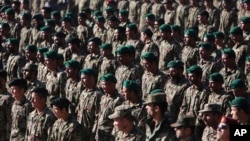U.S. officials say the force level and dual missions of U.S. and NATO troops remaining in Afghanistan after December have not changed, despite media reports that more U.S troops will stay, and their rules of engagement will be expanded.
A Pentagon spokesman said that while U.S. forces will not specifically go after Taliban targets, anyone posing a threat to U.S. or Afghan forces will "become fair game."
U.S. State Department spokesman Jeff Rathke, responding to reports the United States will leave several hundred more troops than previously planned in Afghanistan in 2015, said the U.S. combat mission will end this year. But he indicated the force level of 9,800 announced by President Obama in May might take some time to reach.
"[B]ecause of delays in the post-election government formation and the signing of the U.S./Afghanistan Bilateral Security Agreement and the NATO SOFA [Status of Forces Agreement], the force-generation effort for the post-2014 mission is a few months behind where we had hoped to be. But, nonetheless, the United States remains confident that the Resolution Support mission troops, to include 9,800 troops, will be in place in early 2015," Rathke states.
Rathke said the identification and deployment of forces from some of America’s NATO allies have experienced a delay of a few months.
The Reuters News Agency, citing three sources with direct knowledge of the situation, said the U.S. is preparing to increase the number of troops by at least several hundred to fill a gap in the NATO mission.
"We’re still having discussions with our NATO partners about Resolute Support mission and the resources that are going to be required to execute that," said Pentagon spokesman Rear Admiral John Kirby in his address to reporters Tuesday. "As you know, it’s not all an American posture. The 9,800 is the number that the president has authorized for the American presence in Resolute Support, but that still means there’s a couple of thousand or so that need to be provided by coalition partners. We’re still in discussions with them about that."
Last week, The New York Times reported that President Obama decided in recent weeks to authorize a more expansive mission for the military in 2015 that originally planned, a move that it says ensures U.S. troops will have a direct role in fighting for at least another year. The new order reportedly allows American forces to carry out missions against the Taliban and other militant groups threatening U.S. troops or the Afghan government.
Kirby says there has been no decision to expand the troops' role. "And, going into 2015, we’ve always said there’s going to be two missions for our troops going forward. One is to support Resolute Support, which is the train, advise and assist mission, the NATO mission in Afghanistan. And, the other is, or course, to continue to conduct counterterrorism operations in Afghanistan and those will continue. Valid terrorist targets will continue to be prosecuted and our troops will continue to have the right and the ability to defend themselves when needed," he added.
Kirby said valid terrorist targets include "members of al-Qaida, or al-Qaida-affiliated networks and other terrorist groups who continue to pose a threat to the national security of the United States and the lives or our troops. And while we won’t target Taliban just merely for the sake of the fact that they’re Taliban and quote-unquote belligerents, should members of the Taliban decide to threaten American troops, or specifically target and threaten our Afghan partners in a tactical situation, we’re going to reserve the right to take action as needed."
Meanwhile, both The New York Times and Associated Press reported that new Afghan President Ashraf Ghani is lifting the ban on night raids that his predecessor, Hamid Karzai, imposed because they were considered intrusive. Such night raids were considered an important tactic in the fight against the Taliban.
According to the Times, Afghan National Army Special Forces will resume the raids in the New Year and, in some cases, those raids may include U.S. special forces in an advisory role.
RAND Corporation South Asia analyst Rafiq Dossani says Ghani’s decision is welcome following what he describes as the ‘cold war’ that existed between the White House and Karzai:
"We now have a situation where I think he [Ghani] welcomes greater activism by the White House and wants to respond be getting his military more prepared," says Dossani. "I think he’s realizing, having been in office a short while, that his military is extremely weak and in no position really to face threats other than isolated ones, and anything that’s coordinated, like ISIS [Islamic State in Syria] did in Iraq is going to be very hard for him to face."
Dossani says it is a good move and augurs well for peace in the region. He says the new Afghan leader appears determined to bring stability to the country, and one way he hopes to do that is by closing down the rivalry between India and Pakistan.
Dossani says an expanded role for U.S. and NATO forces in Afghanistan may be the result of lessons learned about a premature departure from Iraq and the vacuum created that was filled by militant groups like IS.




